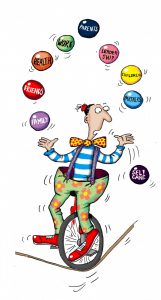
On the 17.05.24 Tilia Lenz, Senior Lecturer presented her research project ‘Reclaiming Resilience- voices from the frontline’ to the UCU Equality Research conference in Manchester. The hybrid conference was open to all and free to attend, attracting 250 delegates.
Resilience, Advocacy and Wellbeing- RAW is a CPD (Continues Professional Development) unit at Bournemouth University. In 2022 Tilia and Dr Rejoice Chipuriro facilitated an action research session (Susman and Evered 1978; Watkins et al. 2019) with 18 students to conceptualize and subsequently Reclaim Resilience! All participants were female and in leadership roles in Health and Social Care, seeking to learn more about RAW. The topic was important to them in practice, despite or because of the inequalities they were exposed to. This word cloud represents their physical and psychological symptoms of stress.
They reflected on their personal circumstances as woman with caring responsibilities and ‘of a certain age’- meaning 30s and 50s. Whilst the women were employed in England, half were of black or ethnic global majority and/or had an international background.
We concluded that those who are less likely to be discriminated against, due to gender, age, health, race and so on, do not find the topic of RAW relevant to them. In fact, it is those in positions of power who create the narrative that individuals are not ‘resilient enough’ and question performance as Galpin (2019) considers.
The themes we identified through the action research were clearly gendered, pointing out women’s health issues during the stages of menopause and the complexities for women with a migration or ethnic global majority background. It signified the inequality of gender and background of our participants within their perceived positions of power in their leadership roles. Tilia collaborated with the cartoonist Harry Venning to create a version of his well-known character Clare in the community, visualising the research findings.
The group challenged the politicisation of the term resilience through their reflective contributions, stories and shared experiences (Phillips and Bunda 2018) of prejudice due to gender, health and race.
Through Appreciative Inquiry (McArthur-Blair and Cockell 2018; Watkins et al. 2019; Arnold et al. 2022) and positive questioning about what could be, rather than focusing on the problem, the group was then empowered to consider actions as individuals and as leaders. They defined what RAW meant to them in their personal and professional lives, defining who practice in health and social care could be made safer through compassionate leadership and organisational cultures of kindness.
 Workshop: Building resilience in Research and Knowledge Exchange 27/4/17
Workshop: Building resilience in Research and Knowledge Exchange 27/4/17










 Nursing Research REF Impact in Nepal
Nursing Research REF Impact in Nepal Fourth INRC Symposium: From Clinical Applications to Neuro-Inspired Computation
Fourth INRC Symposium: From Clinical Applications to Neuro-Inspired Computation ESRC Festival of Social Science 2025 – Reflecting back and looking ahead to 2026
ESRC Festival of Social Science 2025 – Reflecting back and looking ahead to 2026 3C Event: Research Culture, Community & Cookies – Tuesday 13 January 10-11am
3C Event: Research Culture, Community & Cookies – Tuesday 13 January 10-11am Dr. Chloe Casey on Sky News
Dr. Chloe Casey on Sky News ECR Funding Open Call: Research Culture & Community Grant – Application Deadline Friday 12 December
ECR Funding Open Call: Research Culture & Community Grant – Application Deadline Friday 12 December MSCA Postdoctoral Fellowships 2025 Call
MSCA Postdoctoral Fellowships 2025 Call ERC Advanced Grant 2025 Webinar
ERC Advanced Grant 2025 Webinar Horizon Europe Work Programme 2025 Published
Horizon Europe Work Programme 2025 Published Update on UKRO services
Update on UKRO services European research project exploring use of ‘virtual twins’ to better manage metabolic associated fatty liver disease
European research project exploring use of ‘virtual twins’ to better manage metabolic associated fatty liver disease
Well done Tilia & Rejoice.
… and love the cartoon!